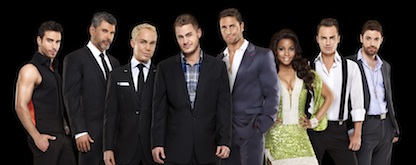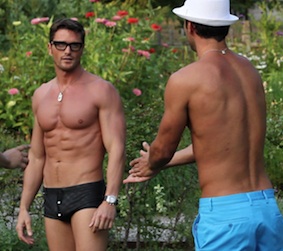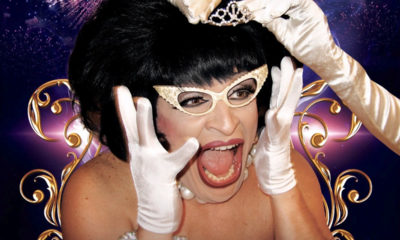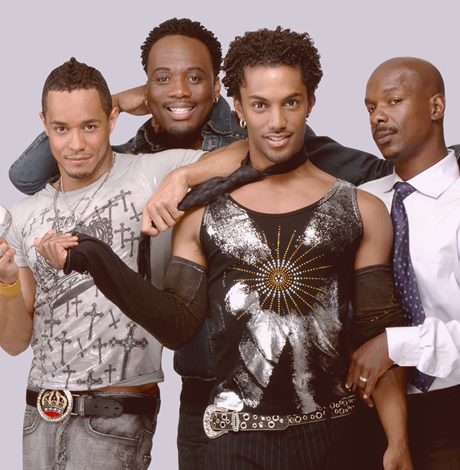Arts & Entertainment
Drama queens
Logo’s ‘A-List’ returns Monday; cast dishes on Reichen’s full-frontal pics, ‘evil’ Austin; Crews follow cast six days per week


The cast of Logo’s ‘A List: New York’s’ second season, which returns Monday night. From left are Rodiney Santiago, Mike Ruiz, Ryan Nickulas, Austin Armacost, Reichen Lehmkuhl, Nyasha Zimucha, Derek Saathoff and TJ Kelly. (Photo courtesy of Logo)
It’s the show gays love — and love to hate. But many, of course, end up watching anyway.
TV’s gayest, guiltiest pleasure — even its creators embrace the “guilty pleasure” label — is back. “A List: New York’s” second season debuts Monday at 10 p.m. on Logo. The entire season one cast returns for 11 new episodes, this time with a gal pal in tow. The Blade spoke with the cast and crew to get the lowdown on the new season, find out what it’s like shooting the controversial series and ponder the show’s appeal.
The reality show, from the same people (True Entertainment) who brought “Real Housewives of Atlanta” to the air, debuted last October and follows the lives of five gay (and one bi; six total) men in New York who claim they’re at the top of the Manhattan social totem pole through their lives, loves and career ventures. Reality show vet Reichen Lehmkuhl (he won the fourth season of “Amazing Race” and formerly dated Lance Bass) unofficially heads the cast. A central theme of the first season was his tempestuous relationship with Brazilian model Rodiney Santiago, with troublemaker Austin Armacost never missing an opportunity to keep their social pot stirred.
It was a hit and helped, along with “RuPaul’s Drag Race,” put Logo, which debuted in 2005, on the pop culture map. The channel, owned by Viacom’s MTV Networks, won’t release ratings for the show but says it’s the second-highest rated show in the gay channel’s history (after “Drag Race”). A Dallas-based spin-off is planned for a fall debut.
The show’s reception has been wildly mixed. Some reviewers and fans say it’s great to see a gay-centric reality show instead of a mainstream show with token gay characters. Others have been appalled at what they say is a superficial and stereotype-laden cringe fest. Still others agree with that assessment but admit it’s well constructed and addictive.
Executive producer Dominic Pupa, who’s gay, says the show is “absolutely” a guilty pleasure and says the critical drubbing doesn’t mean it’s not successful at what its creators are aiming for.
“People roll their eyes all the time, but it captures people’s attention because it’s three things — people with means and access who live in New York. That trifecta of factors means it’s fascinating to watch. There’s something fun about people who are of means and do have access and discovering their lives can be just as exciting, dramatic and disappointing as yours. Plus it’s an ensemble show and people love ensembles because they can pick their favorite and tune in to see how they’re faring. Even the ones people hate — I hate to say character because it’s reality, but in the sense of being a dramatic narrative, they do sort of become characters — you still love to watch the ones you hate.”
Reichen, during a gym break (it’s legs-and-shoulders day; he goes seven days a week), says he learned early on to let go of the naysayers. It was also hard, he says, watching the first season and seeing how much was left out that would have added context to some of the less-flattering scenes.
“I used to read the blogs but then half way through, I stopped. I got rid of my Google alert and I have become a much happier person,” he says. “I kind of live in my own world. There were so many comments about my relationship with Rodiney, they said I didn’t care about him, I just brought him here and dropped him, but the truth is I made sure he had everything he needed and every opportunity he wanted and you know got him on his feet so he could pursue the stuff he wanted to do. It was such a slap in the face to watch this kind of play out in a very one-sided way … Rodiney knew it too. He was like, ‘Oh my god, he tried his best and Reichen’s not like that with me at all.’”
Letting go of the negative energy has centered Reichen in other ways, he says. It helped him shrug off the full frontal nude photos that surfaced recently of him. He admitted the photos — shot from the neck down — are of him.
“If that had happened five years ago, I think I would have shut myself into a mental institution,” he says. “But now my skin is so thick, I knew as soon as they surfaced, there would be every possible reaction. People would make fun of me, they would hate me, some people would like them — you just get to a point where you can deal with it whether it’s good or bad. It totally sucks that they surfaced without my permission — it was supposed to be a private thing, not something I broadcast for the whole world … but I wasn’t gonna pull an Anthony Wiener and lie about it. I was like, ‘Yeah, it’s me, go ahead and start shooting your arrows and let’s get it over with.’ I did mention that a lot of gay men do this kind of thing. I don’t feel I did anything immoral or illegal. It just so happens that because it was me, people cared.”
Rodiney agrees the show complicated their dating life and admits he was naïve about what he was getting into when he signed on.
“Last year was not easy for me,” he says. “It was very intense. It’s like I do the show and I forget I have the cameras with me but it’s who I am and they’re shooting me. There were a lot of difficult people who liked to create drama in my life. I’m the kind of person who just wants to live my life and not worry about somebody else’s life.”

Reichen Lehmkuh (left) and his then-boyfriend Rodiney Santiago in a scene from the show’s first season. (Photo courtesy of Logo)
The couple broke up in November, shortly after the first season started airing. Rodiney admits the show was a factor. Might they still be together without “A-List”?
“I’d say it was half and half,” he says. “The show helped us to break up. We started to date and moved to New York together just six months into the relationship. It was very stressful for us. I can’t handle that.”
Reichen says he and Rodiney are now “friends in the best way possible” and says the second season has been much easier to shoot since he’s not in a relationship.
“It’s been more focused on my business ventures,” he says. “When it comes to the drama, I’ve been off the pedestal in the best way possible.”
New this season is 25-year-old Nyasha Zimucha, a straight entrepreneur and mega-achiever who runs her own business, hair-and-wig shop Embrace Your Hair. She was previously a judge on Little Miss Perfect. She’s a native of South Africa and came to the United States in 2001. She’s been in New York three years and knew “A-List”-er Mike Ruiz before joining the cast.
She says her presence adds an interesting punch to the new season.
“I think you’re going to be very entertained at how some of these relationships develop, both positive and negative,” she says. “It’s an interesting mix. Here you have this straight black girl with these six white, very handsome, very accomplished gay men. I think it’s historic because there’s really been nothing like it on television. You’re going to see not just the fights but the fun too, and I think that will be fun for the audience.”
The second season is still taping even as its first episodes are set to air. Three are fully edited and in the can. Pupa says he doesn’t know how long they’ll shoot — until he feels they have enough footage to bring the storylines to a sensible conclusion.
So how organic or contrived are the scenarios and does editing, obviously a necessity, sometimes distort the narrative?
“Like on any show, we like there to be a beginning, a middle and an end,” Pupa says. “You want to see the cast members start somewhere and end somewhere else. For each one it’s different. Last season we were still shooting until 10 days before the last episode, which is really unusual for this type of show … but it’s a lot more real than people think. They think it’s all very planned out but it’s really not. We ended last season with an argument between Austin and Reichen. That happened less than two weeks before it aired.”
None of the participants were contractually obligated to return for the second season. And the producers don’t tell them they have to meet with certain people or attend certain events. They take suggestions, though, and say they want to do their part to make the show as compelling as possible.
“It’s a nice relationship with cast and production,” Reichen says. “We all understand the result is trying to create something that people will want to watch.”
Camera crews follow cast members six days per week for about 10 hours each day when the show is shooting. Pupa says the cast does its best to schedule things more likely to be interesting when the show is shooting and save the boring stuff — like meeting with lawyers for their business ventures — off-camera. Reichen, for instance, says he traveled much of the six months between the two seasons, though he did see all the cast members at least once during that time, most often at charity events, which he says draw little media attention. He guesses he was only in New York for about 60 days of that six months. He’s been busy prepping a new book and getting ready to launch a fragrance line.
Often the best moments happen when the full cast is together.
“That’s when we have the greatest dynamic,” Pupa says. “Everybody loves Ryan. If he’s throwing a party, you know the whole cast will be there. If Austin throws a party, we don’t know who will walk through the door.”
And what about Austin — is he really the troublemaker he seemed to be from season one?
Reichen says there’s “some stuff” between them that goes down in season two. “You’ll just have to watch,” he says.
Rodiney has a tougher assessment.
“I don’t trust him and we cannot be friends,” he says. “He’s the kind of person I want him far away from my life. He’s evil and he does crazy stuff and I don’t want him part of my life.”
Pupa says Austin is reality’s answer to characters like Alexis and J.R.
“The golden rule of docu soap TV is that just because someone is hated doesn’t mean they’re not watchable,” he says. “It’s a Joan Collins thing for sure. Sometimes you don’t want to admit to liking Austin, but you love watching him.”
Nyasha says the title is a bit of a misnomer and says the show ultimately works because it’s real and people from all walks of life can relate.
“What it’s really about is interesting, dynamic people living in New York,” she says. “Some have great careers and some ain’t doing nothing, but it unfolds as great TV because it’s honest. Even a young straight woman can relate to this or that. Some might think, ‘I don’t relate, what the hell am I doing watching this crap?’ but any level of negative is part of the drama of any relationship and there’s not one person who doesn’t have some level of drama. If there is, give me their number. … It’s just heightened because it’s on TV.”
Theater
‘Bad Books’ a timely look at censorship in local library
Influencer vs. conservative parent in Round House production

‘Bad Books’
Through May 4
Round House Theatre
4545 East-West Highway
Bethesda, Md.
Tickets start at $43
Roundhousetheatre.org
While a library might seem an unlikely place for a heated contretemps, it’s exactly the spot where adults go when they’re itching to battle out what books minors might be allowed to read.
In Sharyn Rothstein’s “Bad Books,” two women, The Mother (out actor Holly Twyford) and The Librarian (Kate Eastwood Norris), swiftly become mired in a quarrel that comes with some weighty repercussions.
The Mother is a popular conservative influencer on a mission. She’s furious that the local library has overstepped its bounds and she blames The Librarian, a woman who adheres to the “it takes a village” method of child rearing and is dedicated to the young people who approach her reference desk.
There’s some background. It seems The Librarian who dresses young (tight jackets and Doc Martens) and curses a blue streak, forged a friendship with Jeremy, a teenage library regular.
While the details are a bit hazy, it seems the troubled Jeremy confided in The Librarian regarding some personal issues. In return, she suggested a helpful book – Boob Juice.
Unsurprisingly, based solely on its title, the book has thrown The Mother into a pique of outrage. After finding Boob Juice in her son’s bedroom, she made a beeline to the library; and not incidentally, The Mother hasn’t read the recommended work and has no plans to do so.
Set in a suburb with lax gun laws, the story explores facets of division and conciliation. The Mother insists she isn’t so much about banning books as she is keeping some books away from young people until they’ve obtained parental approval.
“Bad Books” is performed in the round. Built on a rotating stage, Meghan Raham’s set is simple, pleasingly serviceable, and easily transforms from the library into a small corporate office, and later the assembly room of a church. Overhead floats a circular glass shelf filled with a cache of banned books. Things like a rolling book cart and a goldfish bowl add some flavor to the different locations.
The Mother wasn’t always a popular conservative warrior with an enthusiastic horde of followers.
Her past includes penning a book that later filled her with guilt and regret. She refers to that early questionable literary accomplishment as her bad book. And while over the years, she has persevered to find and destroy each and every printed copy, she hasn’t entirely succeeded.
Norris plays three women who figure meaningfully into the arc of Twyford’s mother character. In addition to The Librarian, Norris is The Manager, a broadly played piece of comic relief, and The Editor, a warm woman who reveals things about Jeremy that his own mother never knew.
Smartly staged by Ryan Rilette, the production is part of a National New Play Network Rolling World Premiere. While Rothstein’s script offers two strong roles (skillfully performed by celebrated actors Twyford and Norris), its ending feels too neatly resolved.
In the past, Twyford and Norris have successfully joined forces for numerous DMV productions including Studio Theatre’s production of David Auburn’s two-hander “Summer, 1976,” the story of a longtime and unlikely friendship between two women who meet as young mothers during the Bicentennial summer.
Though different, both The Librarian and The Mother share a strong and ultimately hopeful relationship with words.
There’s a quote from E.B. White’s classic “Charlotte’s Web” that pops up a couple of times in the briskly paced 80-minute play. Charlotte, the wise spider, says, “with just the right words you can change the world.”
Books
‘Pronoun Trouble’ reminds us that punctuation matters
‘They’ has been a shape-shifter for more than 700 years

‘Pronoun Trouble’
By John McWhorter
c.2025, Avery
$28/240 pages
Punctuation matters.
It’s tempting to skip a period at the end of a sentence Tempting to overuse exclamation points!!! very tempting to MeSs with capital letters. Dont use apostrophes. Ask a question and ignore the proper punctuation commas or question marks because seriously who cares. So guess what? Someone does, punctuation really matters, and as you’ll see in “Pronoun Trouble” by John McWhorter, so do other parts of our language.

Conversation is an odd thing. It’s spontaneous, it ebbs and flows, and it’s often inferred. Take, for instance, if you talk about him. Chances are, everyone in the conversation knows who him is. Or he. That guy there.
That’s the handy part about pronouns. Says McWhorter, pronouns “function as shorthand” for whomever we’re discussing or referring to. They’re “part of our hardwiring,” they’re found in all languages, and they’ve been around for centuries.
And, yes, pronouns are fluid.
For example, there’s the first-person pronoun, I as in me and there we go again. The singular I solely affects what comes afterward. You say “he-she IS,” and “they-you ARE” but I am. From “Black English,” I has also morphed into the perfectly acceptable Ima, shorthand for “I am going to.” Mind blown.
If you love Shakespeare, you may’ve noticed that he uses both thou and you in his plays. The former was once left to commoners and lower classes, while the latter was for people of high status or less formal situations. From you, we get y’all, yeet, ya, you-uns, and yinz. We also get “you guys,” which may have nothing to do with guys.
We and us are warmer in tone because of the inclusion implied. She is often casually used to imply cars, boats, and – warmly or not – gay men, in certain settings. It “lacks personhood,” and to use it in reference to a human is “barbarity.”
And yes, though it can sometimes be confusing to modern speakers, the singular word “they” has been a “shape-shifter” for more than 700 years.
Your high school English teacher would be proud of you, if you pick up “Pronoun Trouble.” Sadly, though, you might need her again to make sense of big parts of this book: What you’ll find here is a delightful romp through language, but it’s also very erudite.
Author John McWhorter invites readers along to conjugate verbs, and doing so will take you back to ancient literature, on a fascinating journey that’s perfect for word nerds and anyone who loves language. You’ll likely find a bit of controversy here or there on various entries, but you’ll also find humor and pop culture, an explanation for why zie never took off, and assurance that the whole flap over strictly-gendered pronouns is nothing but overblown protestation. Readers who have opinions will like that.
Still, if you just want the pronoun you want, a little between-the-lines looking is necessary here, so beware. “Pronoun Trouble” is perfect for linguists, writers, and those who love to play with words but for most readers, it’s a different kind of book, period.
The Blade may receive commissions from qualifying purchases made via this post.

Friday, April 18
“Center Aging Friday Tea Time” will be at 2 p.m. on Zoom. This is a social hour for older LGBTQ+ adults. Guests are encouraged to bring a beverage of choice. For more details, email [email protected].
Go Gay DC will host “LGBTQ+ Community Social in the City” at 7 p.m. at Hotel Zena. This event is ideal for making new friends, professional networking, idea-sharing, and community building. This event is free and more details are available on Eventbrite.
Trans and Genderqueer Game Night will be at 6 p.m. at the DC Center for the LGBT Community. This will be a relaxing, laid-back evening of games and fun. All are welcome and there’ll be card and board games on hand. Feel free to bring your own games to share. For more details, visit the DC Center’s website.
Saturday, April 19
Go Gay DC will host “LGBTQ+ Community Brunch” at 11 a.m. at Freddie’s Beach Bar & Restaurant. This fun weekly event brings the DMV area LGBTQ+ community, including Allies, together for delicious food and conversation. Attendance is free and more details are available on Eventbrite.
LGBTQ People of Color Support Group will be at 7 p.m. on Zoom. This peer support group is an outlet for LGBTQ People of Color to come together and talk about anything affecting them in a space that strives to be safe and judgement free. There are all sorts of activities like watching movies, poetry events, storytelling, and just hanging out with others. For more information and events for LGBTQ People of Color, visit thedccenter.org/poc or facebook.com/centerpoc.
“Spark Sapphic Social” will be at 8 p.m. at Spark Social House. This weekly sapphic social is an opportunity to mix and mingle with other sapphics in D.C.’s newest LGBTQ bar. This event is free and more details are available on Eventbrite.
“DC Drag Brunch on Rooftop – Penthouse (Formerly at Lima Twist)” will be at 12 p.m. at Baby Shank Rooftop. Hosted by Miss Capital Pride, this is the ultimate drag brunch experience in Washington, D.C., featuring the fiercest queens around. Prepare to be entertained by glamorous drag queens and celebrated celebrity impersonators, including Taylor Swift, Lady Gaga, Beyoncé, Britney Spears, Nicki Minaj, Ariana Grande, Whitney Houston, Cher and many more. Tickets cost $27 and are available on Eventbrite.
Sunday, April 20
Queer Crayon Club will host “Queer Sketch Social” at 3 p.m. at Sinners and Saints. This is a fun event for LGBTQ+ adults to come together and color. Attendance is free and more details are available on Eventbrite.
Monday, April 21
“Center Aging Monday Coffee & Conversation” will be at 10 a.m. on Zoom. This is a social hour for older LGBTQ+ adults. Guests are encouraged to bring a beverage of choice. For more details, email [email protected].
Tuesday, April 22
Genderqueer DC will be at 7 p.m. on Zoom. This support group is for people who identify outside of the gender binary. Whether you’re bigender, agender, genderfluid, or just know that you’re not 100% cis – this is your group. For more details, visit www.genderqueerdc.org or Facebook.
Coming Out Discussion Group will be at 7 p.m. on Zoom. This is a peer-facilitated discussion group and a safe space to share experiences about coming out and discuss topics as it relates to doing so. For more details, visit the group’s Facebook.
Wednesday, April 23
Job Club will be at 6 p.m. on Zoom. This is a weekly job support program to help job entrants and seekers, including the long-term unemployed, improve self-confidence, motivation, resilience and productivity for effective job searches and networking — allowing participants to move away from being merely “applicants” toward being “candidates.” For more information, email [email protected] or visit thedccenter.org/careers.
Asexual and Aromantic Discussion Group will be at 7 p.m. on Zoom. This is a space where people who are questioning this aspect of their identity or those who identify as asexual and/or aromantic can come together, share stories and experiences, and discuss various topics. For more details, email [email protected].
Thursday, April 24
Virtual Yoga with Sarah M. will be at 7 p.m. on Zoom. This is a free weekly class focusing on yoga, breath work, and meditation. For more details, visit the DC Center for the LGBT Community’s website.
DC Anti-Violence Project Open Meeting will be at 7 p.m. on Zoom. This meeting is open to anyone interested in learning more and getting involved in lessening violence both within and directed towards the LGBT communities. For more information, visit Facebook or Twitter.
-

 State Department4 days ago
State Department4 days agoHIV/AIDS activists protest at State Department, demand full PEPFAR funding restoration
-

 Brazil4 days ago
Brazil4 days agoUS lists transgender Brazilian congresswoman’s gender as ‘male’ on visa
-

 District of Columbia4 days ago
District of Columbia4 days agoCapital Pride wins $900,000 D.C. grant to support WorldPride
-

 Mexico3 days ago
Mexico3 days agoGay couple claims Puerto Vallarta wedding venue discriminated against them











